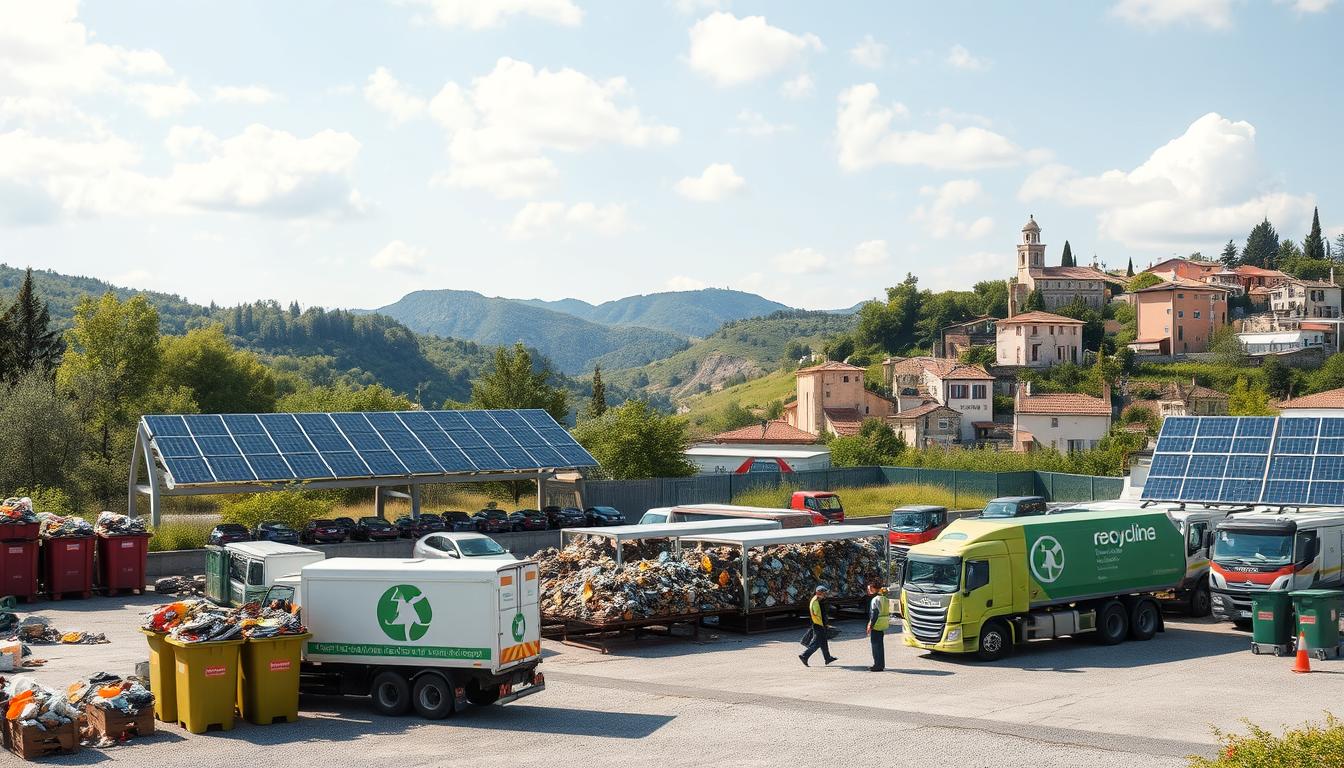“The greatest threat to our planet is the belief that someone else will save it.” – Robert Swan. This quote highlights the urgent need for action on environmental issues, especially waste management. Starting a waste management business in Italy is crucial for our planet and local communities.
Italy leads in sustainable waste practices, with a recycling rate of 85.6%, beating EU goals. Over half of municipal waste is recycled, showing strong environmental commitment. Yet, challenges exist, like in Campania, where infrastructure problems affect waste management.
Starting a waste management business in Italy requires careful planning. We will guide you through the key steps and considerations. Join us in this journey to protect our planet and foster sustainable community growth.
Understanding Waste Management in Italy
Italy has become a top player in Europe for its waste management. It has a strong framework for recycling, strict rules, and gets the community involved. Recycling rates have soared thanks to big public campaigns and laws.
The Zero Waste programme in Capannori is a big success. It cut down landfill waste and boosted recycling. This not only helps the environment but also encourages people to live more sustainably. Italy uses new sorting tech and bio-waste facilities to lead in waste management.
But, Italy still faces big challenges, especially in cities. Overcrowding and more waste put pressure on the system. There aren’t enough recycling spots, and illegal dumping is a big problem, especially in Campania.
Italy has tough laws for waste disposal, including strict landfill rules and penalties for breaking them. These laws help create a culture of sustainability. Recycling is key in Italy’s waste plan, as it cuts down on waste and turns it into something useful.
Using new methods like PAYT (Pay-As-You-Throw) shows how money can motivate better waste sorting. Technology, like smart waste systems, is also important. It helps plan collections better and cuts down on waste pickups. Working together, the government, companies, and people can make a greener future.
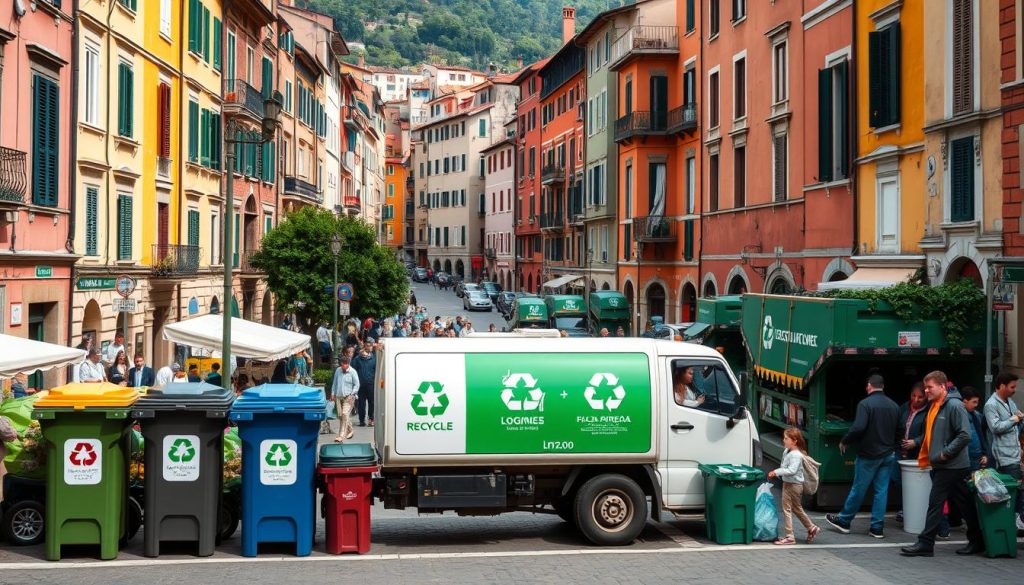
Definition and Classification of Waste
Knowing what waste is is key to managing it well in Italy. Waste is anything we throw away or plan to. It includes many types of materials, showing we need good ways to handle them.
The way we sort waste is important. We divide it into two main groups: municipal and special waste. Municipal waste is what we throw away at home. Special waste needs special care because it’s dangerous.
There are more details within these groups:
- Hazardous Waste: This waste is harmful to people or the environment. It’s marked with an asterisk in waste codes.
- Non-Hazardous Waste: This waste is safe and can often be recycled or thrown away easily.
The waste code helps us identify and manage different types of waste. It’s a six-digit number with dashes. Using this code helps us handle waste correctly.
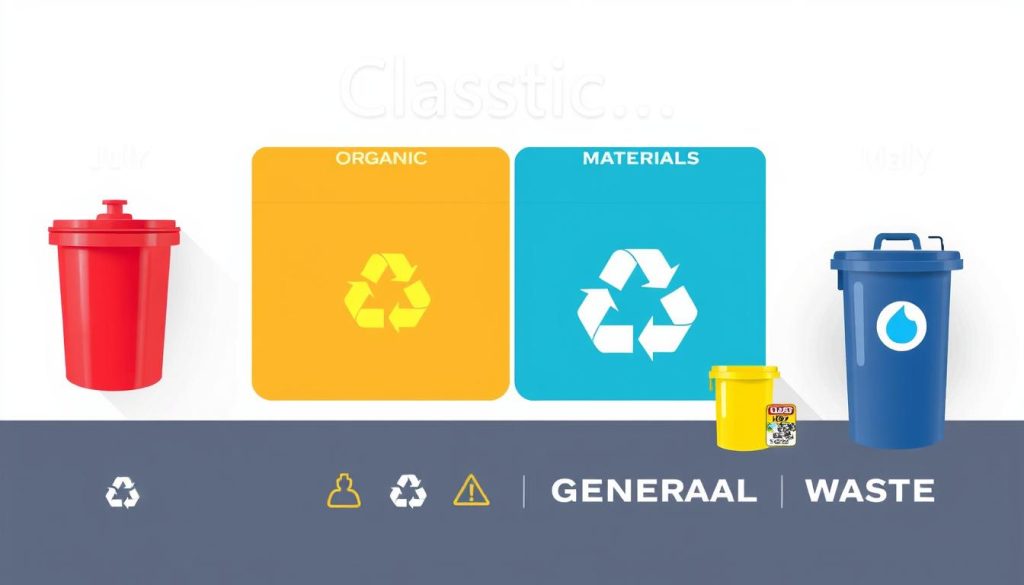
- Construction and Demolition Waste: This waste can have harmful substances like asbestos. It also includes metals, cement, and paints.
- Healthcare Waste: From hospitals, this waste includes non-infectious and hazardous types. It needs careful handling.
- Electronic Waste: This waste, like batteries and fluorescent tubes, has hazardous parts. It needs special treatment.
- Vehicle Waste: This waste is often hazardous because of oil and toxic materials. It needs strict management.
- Packaging Waste: Mostly safe, but plastic and metal can be hazardous if not managed right.
In summary, understanding the different types of waste helps us manage them better. This way, we can tackle the unique challenges each type presents.
Legal Obligations for Waste Producers
In Italy, waste producers are key to managing waste well. They must follow laws to handle waste safely and responsibly. Waste producers must only give waste to approved businesses for treatment or disposal.
The Duty of Care law guides those involved in waste management. This includes importing, producing, and disposing of waste. It covers many types of waste, like household and industrial waste. But, it doesn’t include certain types like radioactive waste or sewage.
As waste producers, we must make sure waste is properly treated or recovered. Households sort waste into recyclables and general waste for local collection. Businesses have more complex tasks due to their varied waste and storage needs.
- If businesses use waste dealers or brokers, they share Duty of Care responsibilities.
- Businesses that change waste composition are considered waste producers from the start.
- Everyone involved in waste management should look at DEFRA’s Waste Duty of Care Code of Practice for help.
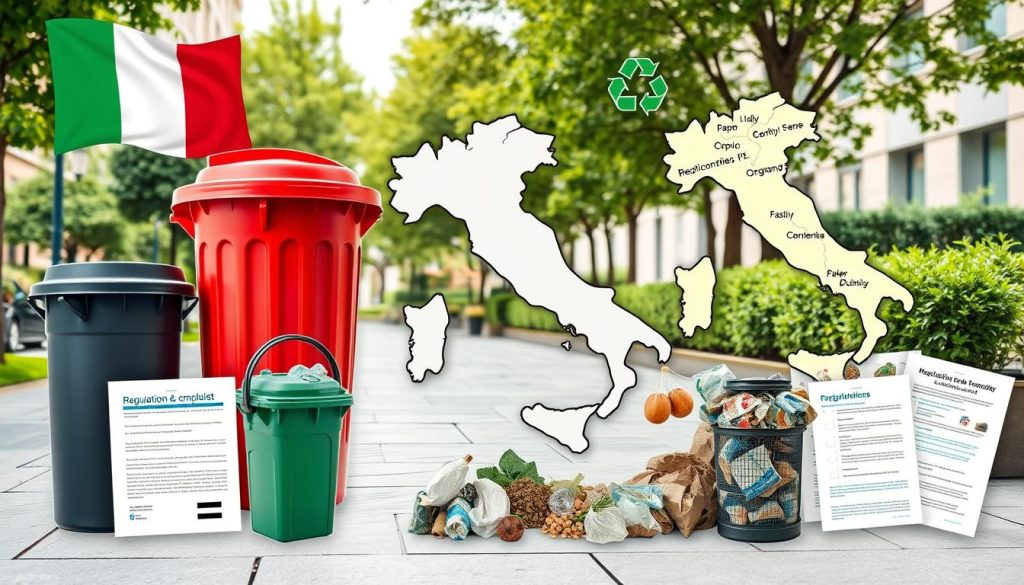
Setting Up a Waste Management Business
Starting a waste management business in Italy comes with its own set of challenges and opportunities. We must first do thorough market research. This helps us understand what people need and who we’re up against.
After researching, we need to make a detailed business plan. This plan should have a clear mission, a solid structure, and specific goals. It also needs to outline who our customers are and who our competitors are. A good plan helps us navigate the complex world of starting a business in Italy.
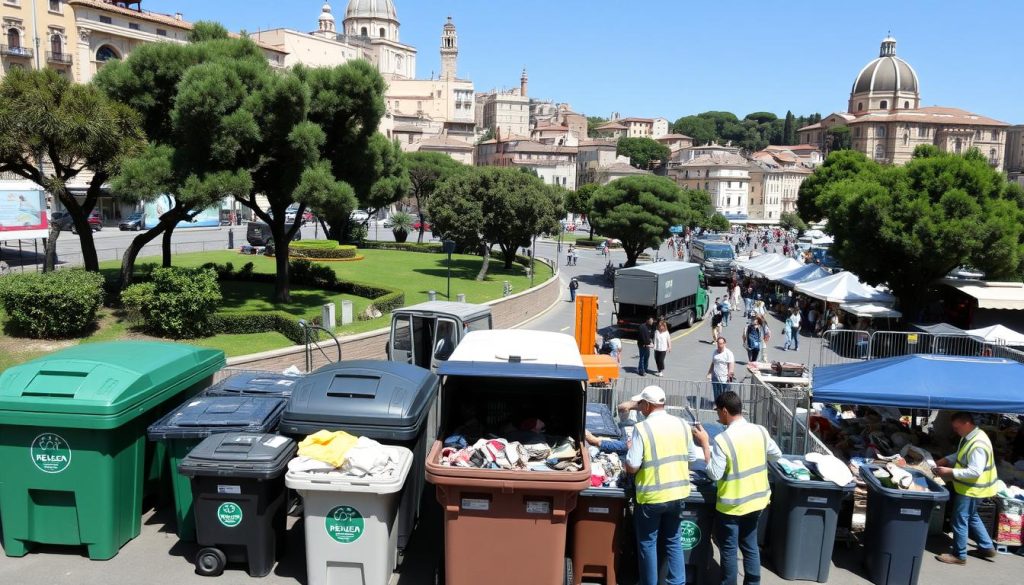
When it comes to money, we should look for investors or lenders who can back our business. We’ll need to present a strong case to them, showing how we plan to make money and help the environment.
Registering our business and getting the right permits is key. This makes sure we follow the law and can operate well. Choosing the right business structure, like being a sole trader or a partnership, also affects how we work.
We’ll need to buy the right equipment, like trucks and recycling facilities. Using the latest technology, like waste planning software, can make our operations more efficient.
Knowing the rules and standards for waste management in Italy is crucial. It helps us stay legal and support the environment. With this foundation, we can build a business that meets the growing need for better waste management.
Regulatory Framework for Waste Management Operators
In Italy, the rules for waste management are key to keeping our environment safe. These rules follow both EU and national laws. It’s important to know and follow these to keep our businesses legal.
Waste management companies have a big role in following these rules. By doing so, we help the planet and make money. The rules are based on ten principles that help create a fair market for all.
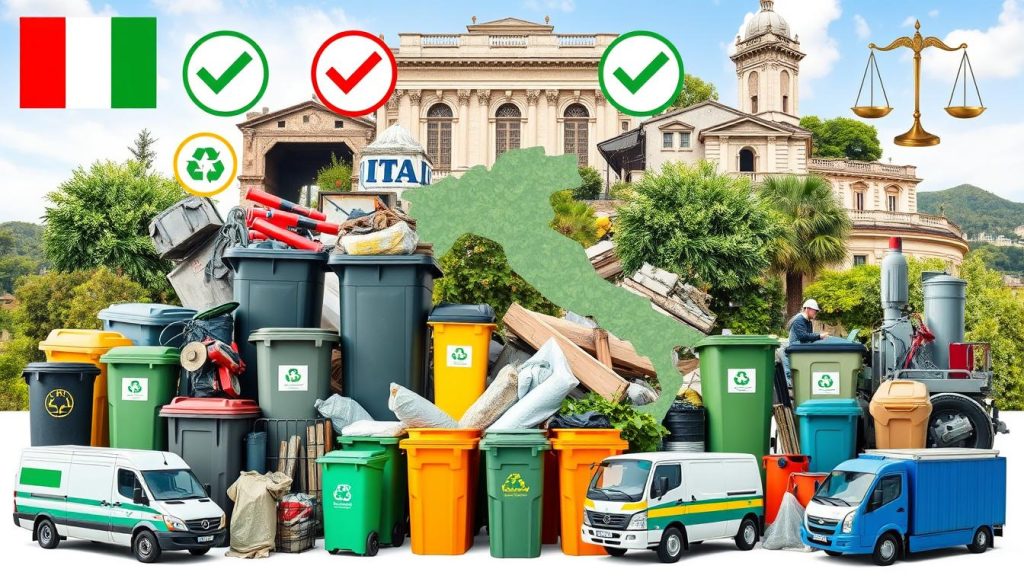
Important parts of the rules include setting national standards for waste and using Extended Producer Responsibility (EPR) schemes. These help us manage waste better. Also, eco-design standards aim to reduce environmental harm from the start, encouraging new ideas from makers.
Increasing how often recycling is collected is another key point. This helps us recycle more and use less landfills. Also, using digital tools to track waste can help us manage better.
Creating a new body to check if we follow these rules is also suggested. This body is crucial for cutting emissions and reaching climate goals. It also helps the economy grow in our field.
By grasping the details of these rules, we become responsible waste managers. We’re ready to face the challenges and chances that come with this job.
Certification and Authorisations Required for Waste Management
Starting a waste management business means we need to know about certifications and authorisations. Getting the right certification shows we follow the law and are trustworthy. It’s also important to work with local authorities, as they help protect the environment.
Understanding the Role of Regional Authorities
Local authorities are key in the certification process. They check if our waste management meets environmental rules. Each area has its own rules, based on the Waste Regulations of England and Wales. Working well with them helps us get permits and stay in line with the law.
Obtaining Necessary Permits
Getting permits involves several steps. Applying for a standard permit is quicker and cheaper than bespoke ones. Standard permits cover things like composting or recycling metals. But bespoke permits need more detailed plans and risk assessments.
There are fees for permits, set by the Environment Agency. We must fill out forms carefully. If we make mistakes, our application might be rejected.
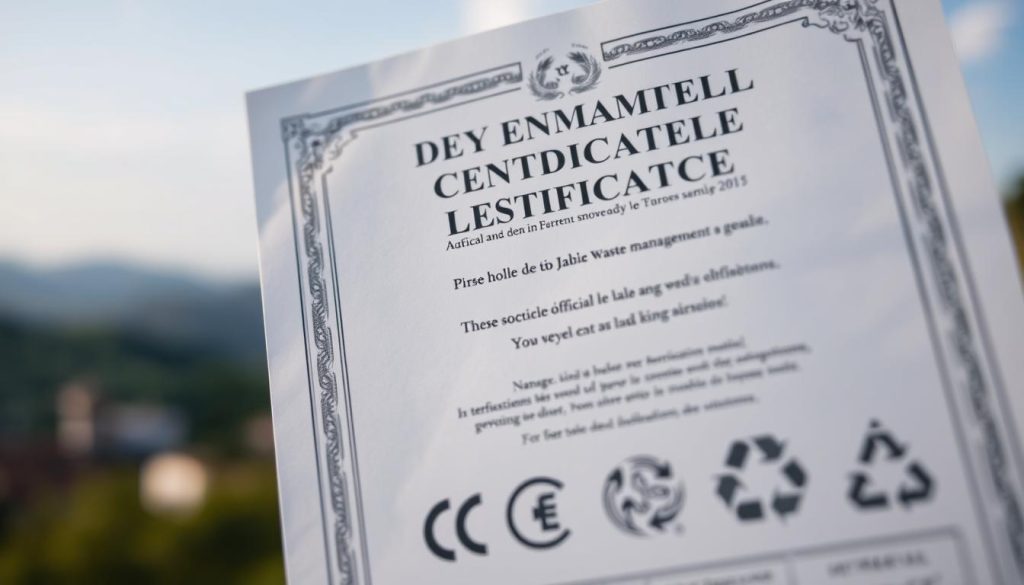
Hazardous Waste Management Obligations
Businesses have big responsibilities when it comes to managing hazardous waste. It’s key to know the obligations for hazardous waste to keep everyone safe. There are four main types of hazardous waste: ignitable, corrosive, reactive, and toxic. Each needs special handling and disposal.
Following laws like the Environmental Protection Act 1990 and the Hazardous Waste Regulations 2005 is a must. These rules have 12 parts and 78 subsections. They tell businesses exactly what to do. For example, if a business makes over 500kg of hazardous waste a year, they must tell the Environment Agency and register as a hazardous waste site. They also need to renew this registration every year.
- Accurate identification and classification of waste streams is crucial
- Secure storage facilities must be established to prevent leaks, spills, and unauthorized access
- Transportation of hazardous waste requires adherence to specific regulations regarding vehicle types, packaging, and labelling
- Disposal and treatment should occur at authorized facilities equipped to manage hazardous materials safely
Not following these rules can result in big fines, up to £5,000. This shows how important it is to manage hazardous waste carefully. The Strategy for Hazardous Waste Management in England, published in 2010, helps businesses in this area.
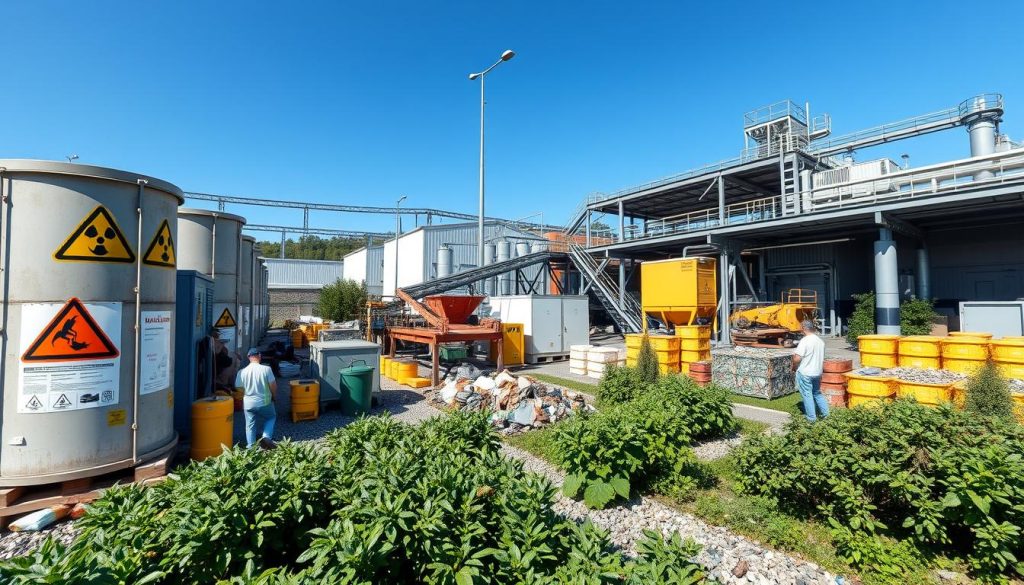
For help, companies like J&J Franks have years of experience. They offer services in hazardous waste disposal, skip hire, and waste removal in Surrey and nearby. Proper waste management helps businesses follow the law and also helps the environment and community.
Operational Guidelines for a Waste Management Business
In 2024, having strong operational guidelines for waste management is key. It helps reduce our ecological footprint and cuts costs. Good waste management boosts our brand image, showing we care about the planet and follow the law.
Training and raising employee awareness is a big part of these guidelines. A well-informed team is essential for effective waste management. They need to know their roles, especially in sorting waste and following rules.
Source separation is also crucial. By 31 March 2025, businesses must sort dry recyclables, food waste, and black bin waste. Micro-firms have until 31 March 2027. Proper sorting helps us follow the law, improves recycling, and saves on waste disposal costs.
Using new waste tracking tools helps us manage waste better. These tools give us real-time data, helping us make smart choices. Working with waste providers is also important to keep up with environmental standards and manage waste well.
Staying on top of new rules and practices is vital. Following these guidelines makes our waste management business both green and cost-effective.
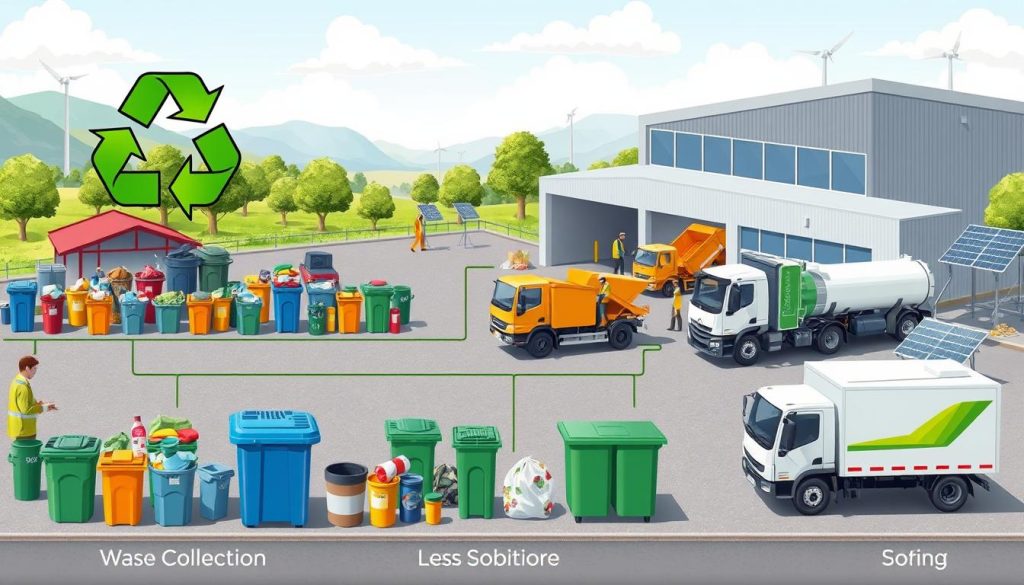
Waste Recovery Processes – End of Waste Regulation
The end of waste regulation is key to knowing when materials are no longer waste. Article 6 of the Waste Framework Directive 2008 explains this. Materials stop being waste if they have a clear use, a market, meet technical standards, and don’t harm the environment or health.
To be considered not waste, certain criteria must be met. These include the types of waste allowed, approved treatment methods, quality standards, management systems, and a statement of conformity. The form for requesting end of waste status requires detailed information to check if rules are followed. The ‘final waste-derived material’ is what has reached this status.
A detailed summary is crucial for waste management requests. It should include information about the companies, types of waste, treatment methods, materials produced, and their intended use. It should not exceed four pages. The process inputs must list both waste and non-waste materials, along with their EWC codes.
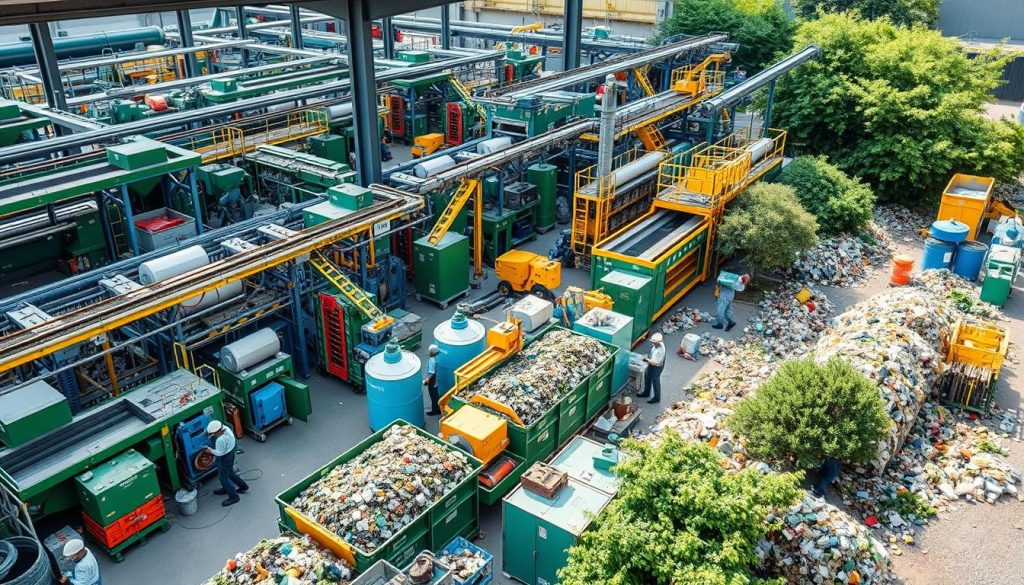
Also, permit details for activities that produce waste for final material production must be provided. Businesses should explain where each waste type comes from and any possible variations. It’s important to understand the whole process from waste creation to acceptance.
Businesses often need to provide sampling data for input wastes. It’s recommended to have at least 20 samples to accurately describe the waste composition. This helps identify any harmful substances and assess risks to the environment and health.
Managing waste well means following the Waste Regulations 2011 in the UK. This includes separating materials like paper, plastic, and glass from food waste. In Wales, specific rules require sorting into categories like food, paper/card, glass, and textiles.
The value of good waste recovery processes cannot be overstated. They ensure rules are followed and help the environment. Keeping up with the end of waste regulation boosts recycling efforts, reducing waste in our communities.
Equipment and Resources Needed for Effective Waste Management
Running a waste management business well needs the right equipment and resources. The right gear helps us collect, sort, and process waste properly. Knowing what vehicles and tools we need makes our work smoother and helps the planet.
Types of Vehicles Required for Waste Collection
The right vehicles are key for collecting waste. They must handle different types of waste well. Here are some important ones:
- Refuse collection vehicles for general waste.
- Recycling trucks with special compartments for recyclables.
- Special vehicles for hazardous waste to keep it safe.
- Skip trucks for big projects like construction or renovations.
- Small vans for tight spaces in cities.
Choosing modern, green vehicles helps us follow rules and protect the environment.
Essential Tools for Waste Sorting and Processing
We also need tools to sort and process waste well. Important tools include:
- Sorting stations for separating recyclables by hand.
- Conveyor belts to move waste quickly.
- Baling machines to pack recyclables tightly.
- Shredders to make organic or big waste smaller.
- Segregated bins for different waste types to encourage recycling.
Using top-notch tools boosts our work efficiency and follows waste rules. This keeps workers safe and promotes a green culture in our company.
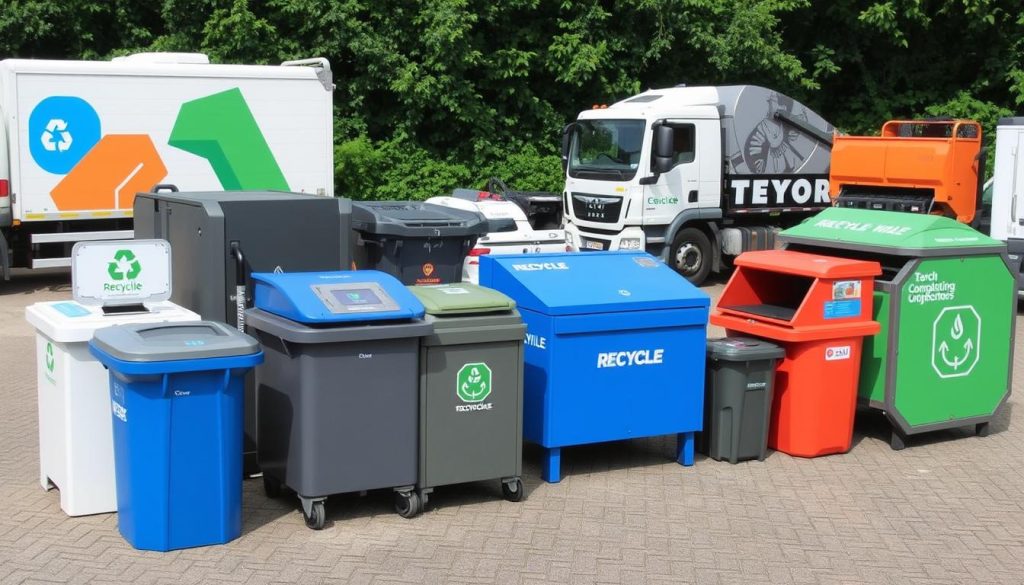
Market Analysis for Waste Management Services
The waste management market in Italy is growing fast. It’s shaped by strong demand and changing rules. The global market for these services has seen big growth, thanks to different areas contributing a lot.
Solid waste management is the biggest part, making up almost 64% of the market in 2023. Urban growth and stricter rules have made the municipal segment very important. It now has over 55% of the market.
Good waste disposal methods are key. The collection and transport part also plays a big role, with about 45% of the market. This shows how important it is to have efficient ways to move waste.
Experts think recycling will grow a lot, thanks to the circular economy. This area is expected to reach around $660 billion by 2029. The industrial segment is also growing, thanks to strict rules. It’s a big part of business growth plans.
The competition in this field is getting fiercer. Companies are working hard to offer top service and protect the environment. Waste management services in the UK are expected to make more money in the next five years. This is because of more building work and worries about the environment.
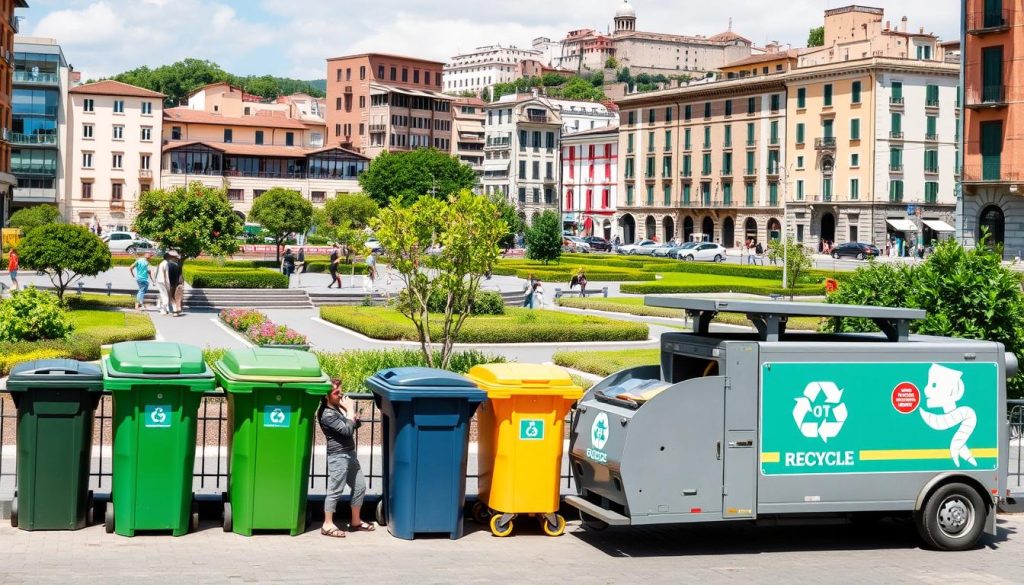
Challenges in Operating a Waste Management Business in Italy
Running a waste management business in Italy comes with many challenges. One big one is following the rules. Companies must deal with the Testo Unico Ambientale, a law from 2006. This law sets out how to dispose of and recycle waste, affecting how well a business can operate.
In cities like Rome, where waste management is a big problem, following the rules is even more important. It affects how people see the business and how well it works.
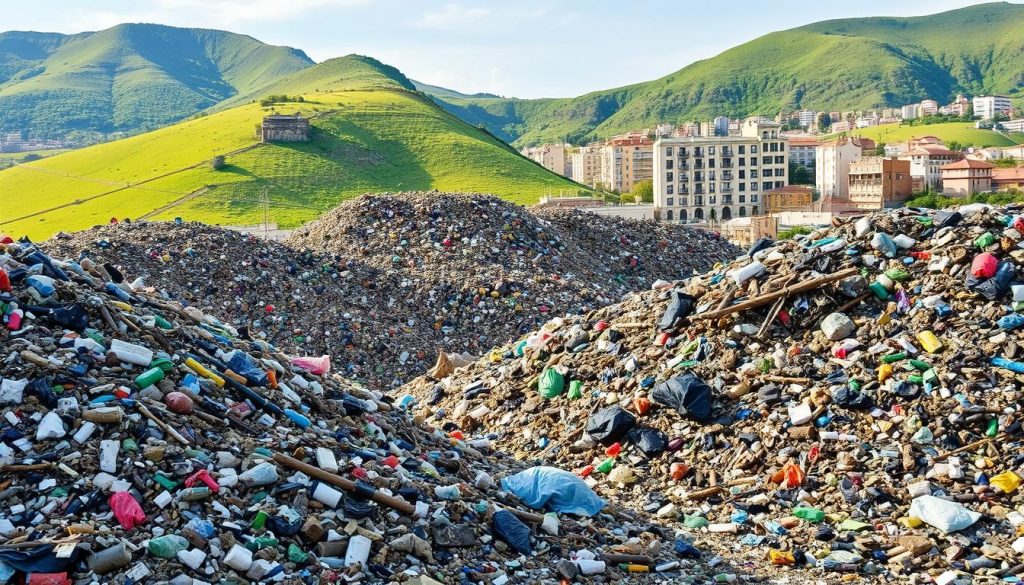
Compliance Challenges with Italian Waste Regulations
Getting the right permits to move waste is a big challenge. The rules say companies need the right papers to do it safely and legally. This can take a long time and make it hard for businesses to work quickly and well.
In places like Rome, there aren’t many places to recycle, leading to overflowing bins and irregular collections. This makes it harder to follow the rules.
Italy makes about 30 million tons of urban waste every year. But only about 50% of it gets recycled. Companies aim to meet recycling targets, relying on good waste management practices. This puts a lot of pressure on a few companies that can handle waste transport well.
Businesses can team up with companies like Ecologistics24 to get the right permits and follow the law. It’s key to sort and move waste properly for sustainability and success. By understanding the rules and using new waste management ideas, we can tackle the many challenges in this field.
Environmental Impact and Sustainability in Waste Management
The way we manage waste greatly affects our planet. Good strategies aim to keep waste out of landfills, which cuts down on harmful emissions. Recycling materials like paper, plastic, glass, and metals uses less energy than making new ones from raw materials.
By choosing to recycle and use sustainable materials, we show we care about the planet. This builds trust with people who want to protect the environment. It also creates jobs and helps keep our communities healthy.
Using waste-to-energy technologies is a smart way to handle waste. It helps us use less fossil fuels. Local campaigns encourage people to reduce waste, making our efforts more effective.
Old ways of throwing away waste harm our planet and use up natural resources. But, by recycling, composting, and reducing waste, we can change this. Composting turns organic waste into nutrient-rich soil, helping our farms grow healthier.
When we go green, we attract customers who care about the planet. We save money by not throwing away as much waste. Working together with others makes our efforts even stronger, showing we’re serious about being responsible.
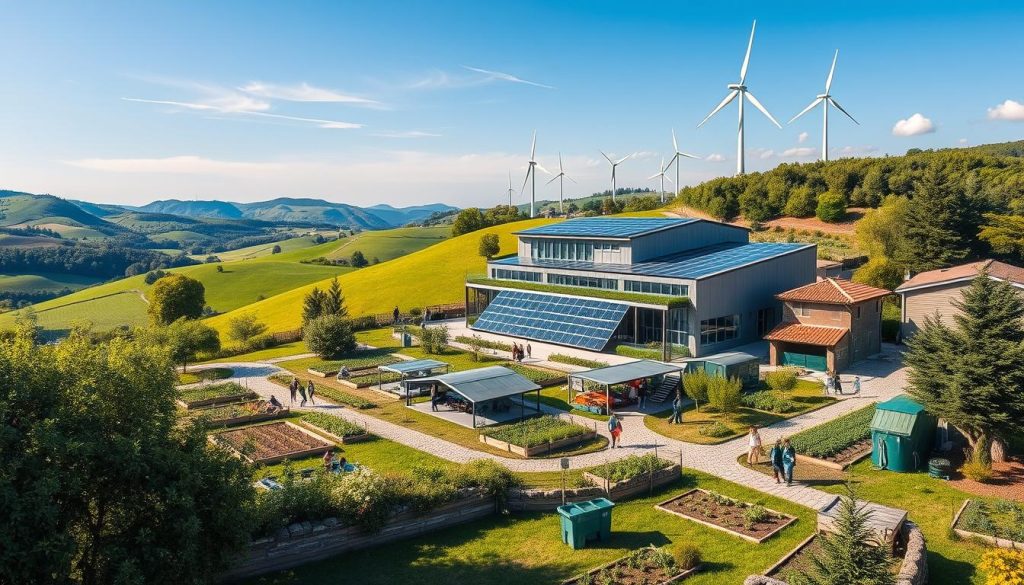
Building Relationships with Local Authorities and Communities
Building strong ties with local authorities and communities is key to waste management success. Collaboration helps us implement effective waste reduction strategies. It also promotes sustainable practices. Engaging local stakeholders creates a supportive environment for waste minimisation programmes.
Engaging in Community Awareness Programmes
Community awareness programmes are essential for teaching residents about waste management. The “Journey to Zero Waste” campaign in San Francisco is a great example. It focused on composting, recycling, and reducing single-use plastics. We can adopt similar programmes to boost local waste reduction and recycling.
Community composting initiatives, like “Composting for Community” in Seattle, offer free composting services. These programmes reduce waste and encourage environmental care. By raising awareness and supporting composting, we strengthen our ties with local authorities and work towards sustainability.
The curbside solid waste and recycling programme in Wheaton, Illinois, shows the power of community engagement. Since 2007, 14,000 households have joined, increasing recycling rates and reducing landfill waste. Such programmes highlight the importance of solid partnerships between community groups and local authorities.
We should focus on both traditional and innovative recycling methods. The Plastic Credit System by Tontoton is a good example. It rewards communities for collecting and recycling plastic, promoting a circular economy. Through these efforts, we can engage our communities and strengthen our ties with local authorities, ensuring our waste management aligns with community goals.
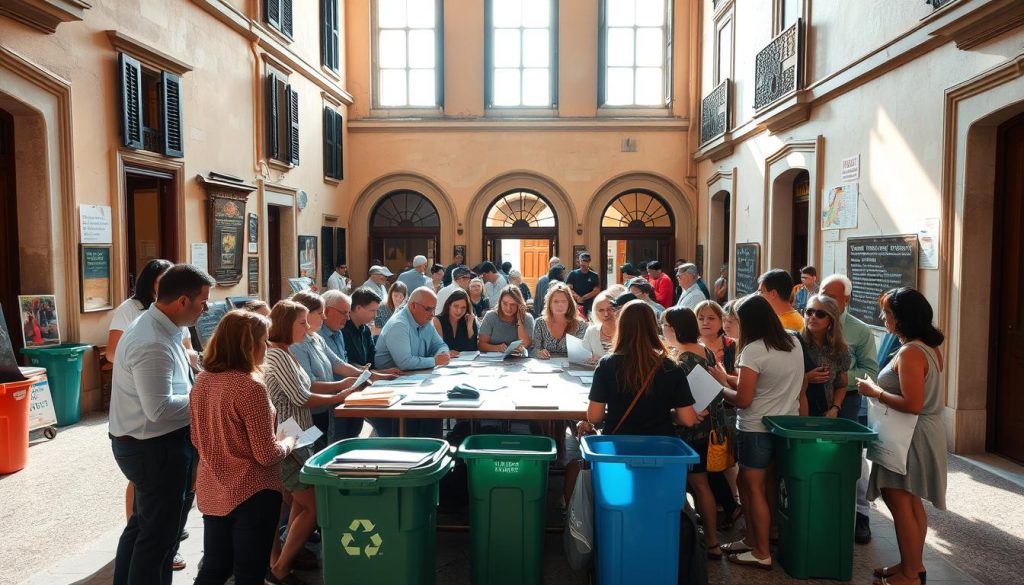
Exploring Partnership Opportunities in the Industry
The waste management industry offers many chances for partnerships. These partnerships can make operations better and services more valuable. By working together, businesses can find new ways to save money and protect the environment.
For example, teaming up to lower waste disposal costs can help financially. It also makes a company look good for caring about the planet.
Working with waste experts can help find better ways to dispose of waste. This can also make money by using materials again. Such partnerships reduce landfill waste and improve a company’s green image.
In Italy, partnerships between public and private sectors have cut down landfill use and emissions. This shows how well working together can work.
Community projects are also key. Team up with local governments and businesses to boost recycling. Educational programs and activities can get people involved in recycling.
These efforts lead to a culture of sustainability. They make communities more eco-friendly.
Collaborations between big companies and startups have also improved recycling. These partnerships help reduce waste’s environmental impact. They show the power of working together to solve waste problems.
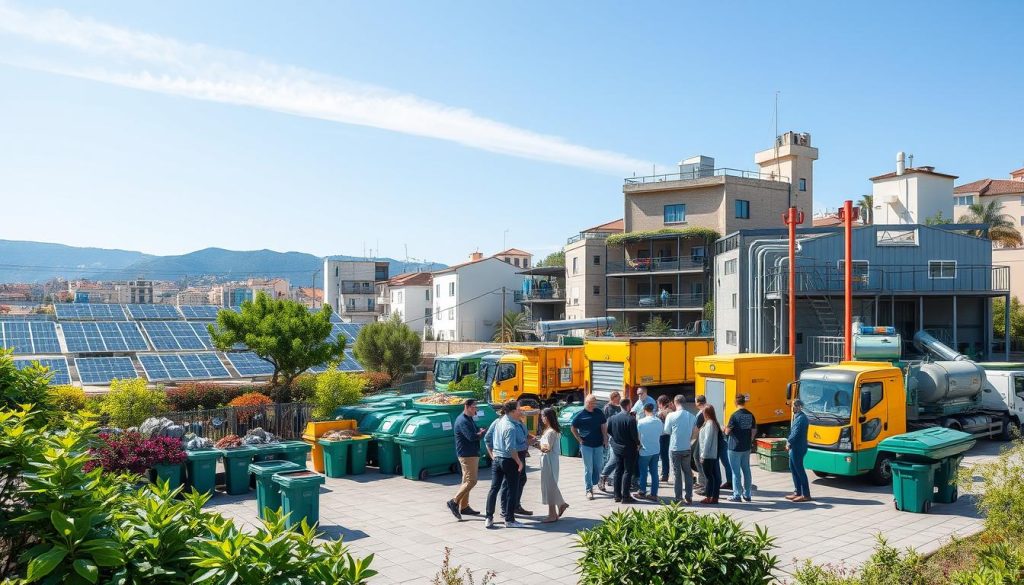
Working with local people can help reduce waste. By joining forces, we can build a circular economy. This focuses on reusing and recycling, increasing recycling rates and reducing landfill use.
By sharing resources and knowledge, we can create smarter waste management systems. These systems can make waste collection more efficient, especially in cities.
In summary, working together in waste management drives innovation and benefits communities. Exploring these opportunities can help us achieve a greener future.
Trends Shaping the Future of Waste Management in Italy
The way Italy manages waste is changing fast. New technologies and a focus on the circular economy are leading the way. Understanding these changes helps us plan for a greener future.
Technological Innovations in Waste Collection
New tech is changing how we collect and sort waste. Better sorting systems and machines make things more efficient and cheaper. Smart bins with sensors help track waste levels, making collections better and reducing harm to the environment.
Shifts Towards Circular Economy Practices
Italy is moving towards a circular economy. This means we see waste as a chance to reuse resources. To make this work, we need to teach people about recycling and using resources wisely.
As recycling rates go up in Europe, it shows we’re getting better at using resources well. This is key for a sustainable future.

Best Practices for Running a Successful Waste Management Business
To run a successful waste management business, we need to follow best practices. These include efficient management and excellent customer service. It’s crucial to handle waste from start to finish responsibly and safely.
This approach not only meets legal standards but also builds trust with our customers. Ignoring rules can result in big fines, so sticking to them is key for our financial health.
Setting up a detailed waste sorting system boosts recycling and cuts down on costs. Training our team on these practices helps everyone work together. A waste audit can show us how to cut waste, saving money and the planet.
We should also use modern technology to improve our waste handling. Digital marketing and local SEO help us reach more people. By using green practices and long-term contracts, we grow and lead in waste management.

